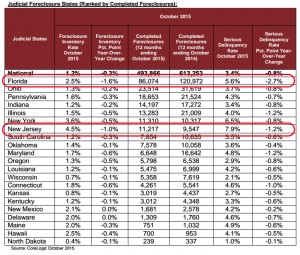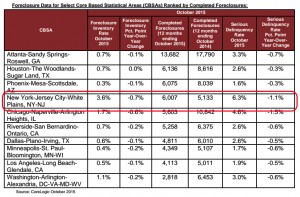Anyone who has been here since the beginning will remember Dominick Prevete, who we regularly sparred with in 2005. Well, it seems that the leading real estate bubble cheerleader has gotten himself into some trouble. But, before we get into that, let’s take a look back and review the history. For those who weren’t around in 2005, take some time to read these, you’ll enjoy them:
October 23rd, 2005: Debunking Another Real Estate Puff Piece
Dear Mr. Prevete,
You, sir, are a moron.
You have optimism over these new “Loan Products”? The new loan products that has the banking industry and the fed shaking in their boots? These new loan products that let underqualified buyers overleverage themselves to purchase overpriced homes that risk significant depreciation? You’re optimistic?
“The only risk is that the underlying asset loses value — and I don’t expect home prices to quickly depreciate,” he said.
Mr. Prevete, would you and your organization (Weichert Realtors) care to sign a contract that holds yourselves responsible for any depreciation or loss on any sales you broker? If prices don’t go down, you’ve got nothing to lose right? Or is this statement just doubletalk? That you do indeed expect home prices to depreciate, just not quickly.
November 16, 2005: N.J. home sale fever breaking, data show
“I believe the NAR numbers don’t reflect the last 45 to 60 days in the market,” said Dominick Prevete, regional vice president for northern New Jersey at Morris Plains-based Weichert Realtors. “In the short term, buyers have been on hold by some recent developments, like the Hurricane Katrina and the quick run-up in energy prices. Those things had people scared and a bit frozen.”
It’s our old friend Dominick Prevete again. You might remember him from “Debunking Another Real Estate Puff Piece”, a few weeks ago, I think I may have called him a skirt wearing, pom-pom shaking cheerleader for saying the market was a “win-win for buyers and sellers” and recommending risky loans. It seems he’s changed his tune a bit, so I wonder if he read my article (I did see alot of hits from Google showing that folks hit my site searching for his name).
Again, however, I must call you a moron Mr. Prevete. What impact would the hurricanes have on buyers in New Jersey? In case you missed it, they didn’t exactly hit here. Or are you just looking for something to blame, calling it only a short term downturn once we get over the pain of the hurricanes? And run up in energy prices? If the recent uptick in energy prices made it hard on someone to purchase a home, I really don’t think those people should be buying a home in the first place. These prospective buyers must be pretty strapped for cash if you are blaming an increase in gasoline prices on the decrease in sales. No Mr. Prevete, the reason people aren’t buying is because more and more people realize that real estate isn’t a “win-win” investment, and you can lose alot of your hard earned money. Buyers know we are in a bubble, and they are smart enough not to buy.
December 24th, 2005: To Warren Boroson and Dominick Prevete
Many of my readers will be familiar with the name Warren Boroson, a local journalist. Warren has written some real gems in the past year, many of which try to entirely discount the fact that there is a speculative bubble in residential real estate. Warren has defended his position so vehemently, one wonders what vested interests he has in it. Warren is at it once again, with his pal Dominick Prevete (regional vp of Weichert) who like clockwork appears in every one of Warrens articles to offer up expert opinion. Warren, why do you continually quote Mr. Prevete in every real estate article you write?
Perhaps I’m being too critical of the duo, the most recent piece at least concedes some possibility there is a bubble, however, the article ends with the usual pro-real estate spin..
So here goes, how the mighty cheerleader has fallen from grace. From the NJ Herald:
Former Weichert executive accused of embezzlement
A 46-year-old former top executive of Weichert Realtors who oversaw the company’s offices in Sussex County and elsewhere throughout the region has been accused in a newly filed company lawsuit of embezzling funds intended for marketing purposes and redirecting them for his own personal use.
Dominick Prevete, who rose from managing the company’s Sparta office to become regional vice president in charge of 23 Weichert offices throughout northern New Jersey, is alleged by the company to have defrauded Weichert and its salespersons by way of multiple acts of theft and forgery.
Prevete, a former Fredon resident who currently resides in Morristown, was fired by the company on Oct. 22 and has since been named by the Morris Plains company in an 11-page civil lawsuit that seeks unspecified compensatory and punitive damages for fraud, breach of fiduciary duty, and civil theft.
Prevete, reached by phone over the weekend, said “it’s (Weichert) a great company and I’m sure we’ll work it out,” but declined further comment.
But an internal company memorandum obtained by the New Jersey Herald, in which employees were directed not to talk to the media but were encouraged to share the information with others, indicates Prevete “stole company monies intended for Weichert Sales Associates and he has confessed to his misdeed.”
The memorandum goes on to state that the matter has been referred to criminal authorities and to the New Jersey Real Estate Commission, which could act to revoke Prevete’s real estate broker’s license.
In its lawsuit, filed in Superior Court in Morris County, the company details an elaborate scheme allegedly devised by Prevete to steal unused funds allocated to the company’s sales representatives for reimbursement of their marketing costs and have them redeposited into his personal bank account.
The lawsuit states that as regional vice president, “Prevete had access to information including which salespersons did not have direct deposit and which salespersons typically did not utilize some or all of their marketing funds” and that he used this information “to defraud Weichert and its salespersons and to benefit himself.”
The lawsuit indicates that Prevete — who, as regional vice president, had the authority to obtain marketing funds for salespersons under his jurisdiction — “abused his access to company information by researching and targeting salespersons who did not have direct deposit of funds so that he could obtain physical checks in a scheme to steal from Weichert and so that such thefts would not be detected.”
Prevete allegedly would then would fill out a form indicating a salesperson was to be paid a marketing allowance, would present the form to Weichert’s commission department for approval, and would then request a check payable to that salesperson.
Upon receiving the check, “Prevete then forged the signature of the salesperson on the check. After forging the salesperson’s signature, Prevete would then endorse the check for deposit into his own personal account.”
“Prevete would then tender the check to his own bank and fraudulently represent that the check had been properly endorsed over to him.”
The lawsuit goes on to detail three specific instances, right down to the check numbers themselves, in which Prevete allegedly forged and cashed checks in the manner described.
In each of the cases, the lawsuit states, “Prevete intentionally stole funds from Weichert by abusing his position to target the salesperson, by misrepresenting that funds were owed to the salesperson, by filling in a (request) form with fraudulent information, by forging the salesperson’s signature on the check and by depositing the funds into his bank account for his own personal gain.”
Hat tip to Wag for letting me know, and Eric Obernauer at the Herald for pulling this piece together. Took ten years to prove what we all knew on day one.


